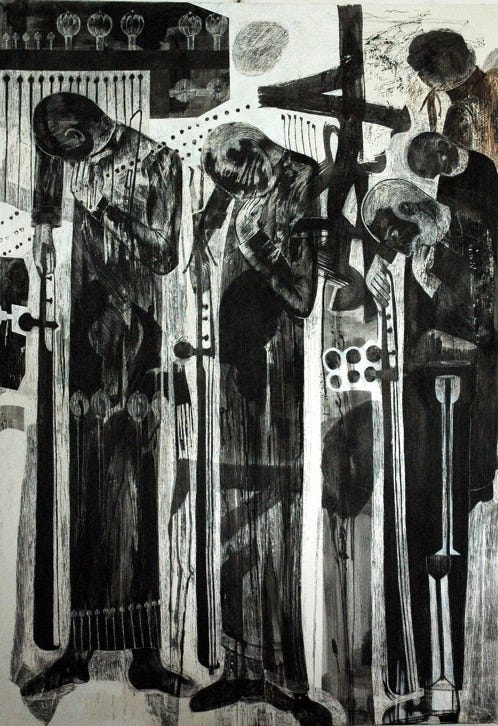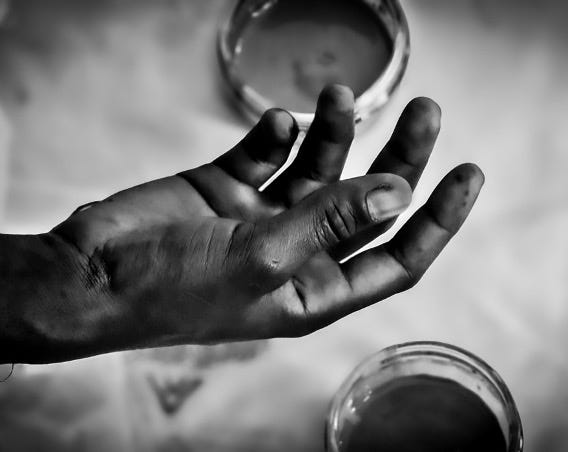In central Prague
above the ancient Jewish cemetery
the crows, blackbirds and ravens hop from foot to foot
squawking
croaking
crying like reminders to the tourists
of the once bemoaning human voices down below,
and these grieving gravestones piled on piles
spied upon by the surrounding building’s decorous eyes
each hallowed place filled with the scent of dusty dreams
and misbegotten terror
still ringing with the murmuring of celebrations
and funereal prayers
where ritual
alive with dreamt of joys and inky sorrows
played a fleshy part in the day-by-day
of streets filled with steaming cabbage cooked and rolled
by fat fingered matrons
whose voices clamored down the cobbles
calling their children
“away from the suspicious stranger dressed in brown”
“away from their flailing marching boots”
“away from their narrow illiterate world of sin-“
back to their mother’s bosom
back to their father’s protective embrace
back to their books
and their prescriptive rites-
and now in streets swamped by tourists
all innocent,
ignorant of the truths and suffering,
not unlike today
where guides-a-babel point to this and that
not knowing between their finger’s outer flesh and distant stones and mortar
were a thousand ghost’s whispering a Pentateuch of dreams
while the ravens, blackbirds and crows above
cry out the songs the chosen used to sing.
***
These are the stories worth remembering,
storing them in the decanter
marked with bloody strokes
‘never forget’ and ‘never again’
while we, on the cusp of damnation
(these few days before the American election of 2024).
look to Lebanon, Gaza and places east of Kiev
and listen to the news
redolent with these new norms:
“55,000 people, including 18,000 children and their thousand and one parents,
including their grandmas who dreamt of brave fathers and their sons,
and of their relentlessly loving mothers and daughters
as they leave the odor of charred flesh in the winds of war,
as editors normalize all the suffering
and as politicians unfold and refold their hands.
Before these days of deep lament
Joseph Conrad wrote,
It appears to us a land without memories, regrets or hope…”
And what I wish to see is art that should save us from hopelessness
but instead I see paintings and photographs, film clips and reality shows
in which there is a yawning gap between the display of reality,
of things that matter,
of profound empathy and shards of hope
or even simple explanations
with all inner meanings, all real help, all embraces forgotten,
denied, lost in the hail of raining dollars.
That is what I hear and see
and my humanity is sickened by it and by the silence of others,
but instead I know in Prague
the blackbirds hop from foot to foot
as elsewhere politicians max out their gold cards
and tour guides shout over the objecting murmur,
“here is other people’s history”,
“here is how I avoid their and my misery”,
“here your disquiet means nothing”,
“for here is where the winners gloat,
and here is how I make a living
you would snatch from me
in exchange for your worthless foreign dreams”.
Ricky Romain is one of a handful of contemporary artists
I know of,
who has chosen to paint his painful, lyrical
and very beautiful and moving images of freedom trapped,
victimised before the gates and barbed fences and captivity,
above the hollow pit, the horror of recognition that they too
have lost someone dear in the meatgrinder of history whose bloody arm
continually assaults the innocent.
His work is well worth looking at, as if reading the poetry of Nazim Hikmet.
You can see a short film here with Ricky playing the Sitar, `
which he is also a master of.






